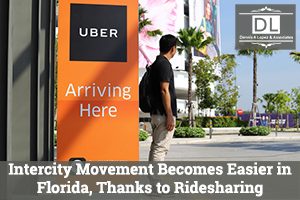Everyone benefits when residents of a state can travel more easily between cities. The transit system gets the funding it needs to continue running, the local economy gets new visitors and more revenue, and residents get to explore new areas. Ridesharing has made it easy for people in five Florida cities to check out surrounding communities.
Phase I of the Intercity Travel Program
Through an Intercity Agreement, Uber offered discounted rides to travelers going to Altamonte Springs, Longwood, Lake Mary, Sanford, and Maitland. The program was funded by taxes, but the government only paid for a specific trip if the destination city could benefit through increased economic activity. The program was extremely successful, leading to less congestion, fewer cars on the road, more shared rides, and more multi-stop trips. In the first year of the program, there was a 74% increase in Uber trips.
Phase II
 The second phase of the program lasted 10 months, and aimed to strengthen local ridesharing programs, as well as local public transit systems. Each city paid 20% of an Uber fare that started in one of the five cities and ended within city limits. On top of that, participating cities paid 25% of rides starting or ending at a SunRail station, which encouraged riders to take advantage of both ridesharing and public transit options.
The second phase of the program lasted 10 months, and aimed to strengthen local ridesharing programs, as well as local public transit systems. Each city paid 20% of an Uber fare that started in one of the five cities and ended within city limits. On top of that, participating cities paid 25% of rides starting or ending at a SunRail station, which encouraged riders to take advantage of both ridesharing and public transit options.
This program was designed to fix many of the problems that exist with other mass transit options, which typically require millions of dollars of investment and result in empty trains and buses that taxpayers still have to pay to maintain.
The Importance of Passengers’ Rights in Ridesharing
Obviously, an increase in ridesharing services yields numerous benefits for everyone involved. But this increase also results in things like an increased number of accidents. In the early days of Uber, Lyft, and other ridesharing services, few passengers knew what to do if an accident occurred. People were often left wondering who was responsible for their medical bills, whose insurance was liable, and how to seek compensation.
Things are different for ridesharing passengers now, however. Thanks to increased pressure from various groups, the state of Florida has regulated ridesharing, and now requires extensive screening of potential drivers, as well as stricter insurance requirements that protect passengers if they are hurt in an accident.
Since Florida drivers have commercial insurance through their ridesharing companies, passengers should be able to easily make claims if an accident leaves them hurt or unable to work. Negotiating with insurance companies can still be extremely stressful, however, particularly for passengers who are recovering from serious injuries. Personal injury attorneys serve as a bridge between injured passengers and insurance companies, advocating for their clients’ best interests at all times.
Get What You Deserve After Your Ridesharing Accident
If you’ve been injured in a ridesharing accident, you should be resting and recuperating, not spending all your time on the phone with medical providers and insurance companies. Call Dennis A. Lopez & Associates today at (813) 502-1836 and let us handle the legal side of your accident.
For More Information:
THE SHOCKING INCREASE OF SCHOOL BUS ACCIDENTS IN TAMPA: WHAT YOU SHOULD KNOW
